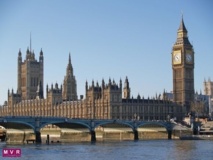English gay marriage plans clear hurdle in parliament
AFP
LONDON- The British parliament's upper house Tuesday voted down a bid to kill off a bill to introduce gay marriage in England and Wales, moving it a step closer to becoming law.
Following two days of impassioned debate in the House of Lords that exposed deep divisions in the unelected upper chamber, peers voted 390 to 148 against the so-called "wrecking" amendment.

The bill is certain to face further stiff opposition during detailed line-by-line scrutiny in its later stages.
The vote result was greeted with cheers from supporters of gay marriage outside the Houses of Parliament in London.
The bill has already been backed by the elected lower House of Commons.
Prime Minister David Cameron is determined to introduce gay marriage as soon as the middle of next year, despite opposition from a hefty chunk of his own centre-right party.
The rancour over gay marriage within the Conservative Party has heaped further pressure on Cameron, who is already facing bitter opposition from many Tories over his leadership style and a promised referendum on Britain's European Union membership.
Conservative Culture Secretary Maria Miller later tweeted: "Great result in @UKHouseofLords tonight, overwhelming support from Peers from all sides."
Gay rights campaigner Peter Tatchell hailed "a victory for love, marriage and equality.
"We are another step closer to our goal of equal marriage," he added. "It signals that the House of Lords accepts the principle that we should all be equal before the law."
But Colin Hart, campaign director for the traditionalist Coalition for Marriage, warned there were battles to be fought.
"The government may have won the vote today but what was clear from the debate was the huge opposition to almost every part of the bill," he said.
"We will continue to campaign to save traditional marriage and today's vote and the concerns expressed by many peers mean we will be able to introduce safeguards that will protect teachers, registrars, chaplains and anyone who works in the public sector."
Gay couples in Britain have had the right to enter into a civil partnership since 2005.
Civil partnerships offer identical rights and responsibilities to civil marriage, although campaigners point to some differences such as international recognition, which applies to marriage but not partnerships.
In plans unveiled in December, the Conservative-Liberal Democrat coalition government said it was proposing to allow same-sex couples to marry.
However, the plans ban the established Churches of England and Wales -- which are opposed -- from conducting ceremonies.
Other religious institutions can "opt in" if they wish.
The other parts of the United Kingdom -- Scotland and Northern Ireland -- have their own law. The Scottish government has confirmed that it will introduce a bill shortly.
--------------------------------------------------------------------------------------------------